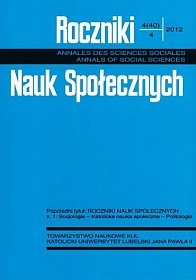Formal aspects of „the nature of politics and society”. An analysis of the „university in exile”, 1933–1945
Abstract
The purpose of this text is to gain a new perspective on the „University in Exile” established 1933 at New School for Social Research (New York) to endow some of Europe’s most brilliant social scientists of the epoch a safe area of intellectual discourse beyond the oppressions of the Fascist regimes in their native countries. The authors analyse the distribution and characteristics of the members’ power to shape faculty’s collective conduct concerning the quest for the nature of politics and society. The method applied is a cluster analysis factoring in the dimensions of occupational continuity, internal visibility, functional representation and interfacultative participation.
References
ASSMANN J., Das kulturelle Gedächtnis. Schrift, Erinnerung und politische Identität in frühen Hochkulturen, München: Beck 2000.
ASSMANN J., Cultural Memory and Early Civilization: Writing, Remembrance, and Political Imagination, Cambridge: Cambridge University Press 2011.
BACKHAUS K. [et.al.], Clusteranalyse, in: Multivariante Analysemethoden. Eine anwendungsorientierte Einführung, Berlin, Heidelberg: Springer 2008, p. 389-450.
BOURDIEU P., Les usages sociaux de la science. Pour une sociologie clinique du champ, Paris: INRA 1997.
BOURDIEU P., Vom Gebrauch der Wissenschaft. Für eine klinische Soziologie des wissenschaftlichen Feldes, Konstanz: UVK 1998.
COLE S., COLE R. J., Visibility and the structural bases of awareness of scientific research, „American Sociological Review” 33 (1968), p. 397-413.
GOODMAN N., Ways of Worldmaking, Indianapolis: Hackett 1978.
GOODMAN N., Weisen der Welterzeugung, Frankfurt am Main: Suhrkamp 1990.
GOSTMANN P., Ideal-/Realtypus, in: Lexikon der Systematischen Musikwissenschaft, ed. H. de la Motte-Haber, H. von Loesch, G. Rotter, Ch. Utz, Laaber: Laaber Verlag 2010.
GOSTMANN P., ›Beyond the Pale‹. Albert Salomons Denkbewegung und das intellektuelle Feld im 20. Jahrhundert, Wiesbaden: Springer VS 2012.
GRANOVETTER M., The strength of weak ties, „American Journal of Sociology” 78 (1973), p. 1360-1380.
HUMBOLDT VONW., Ueber die innere und äussere Organisation der höheren wissenschaftlichen Anstalten in Berlin, in: Werke 4, Darmstadt: WBG 1980, p. 255-265.
KNOKE D., BURT S. R., Prominence, in: Applied Network Analysis. A Methodological Introduction, ed. R. S. Burt, M. J. Minor, Beverly Hills–London–New Delhi: Sage 1983, p. 195-222.
KROHN C.-D., Intellectuals in Exile. Refugee Scholars and the New School for Social Research, Amherst: University of Massachusetts Press 1993.
LACAN J., Das Seminar. Buch XI. Die vier Grundbegriffe der Psychoanalyse, Weinheim–Berlin: Quadriga 1986.
LACAN, J., The Four Fundamental Concepts of Psychoanalysis, New York: Norton & Co. 1998.
LACHMAN Ch., The University in Exile, „Discourse” 2 (1976), p. 25-37.
LUCKMANN B., Eine Universität im Exil: Die Graduate Faculty der New School for Social Research, in: Die Soziologie in Deutschland und Österreich 1919–1945. Materialien zur Entwicklung, Emigration und Wirkungsgeschichte, ed. M. R. Lepsius, „Kölner Zeitschrift für Soziologie und Sozialpsychologie”, Sonderheft 23 (1981), p. 427-441.
MEAD H. G., National-Mindedness and International-Mindedness, „International Journal of Ethics” 39 (1929), p. 385-407.
MERTON K. R., The Sociology of Science. An Episodic Memoir, Carbondale: Southern Illinois University Press 1979.
MEYER T., Die Macht der Ideen. Albert Salomon im Kontext zweier intellektueller Debatten: Weimar und Exil, in: Verlassene Stufen der Reflexion. Albert Salomon und die Aufklärung der Soziologie, ed. P. Gostmann, C. Harpfer, Wiesbaden: VS Verlag für Sozialwissenschaften 2011, p. 157-177.
PARSONS T., PLATT M. G., The American University, Cambridge, Mass.: Harvard University Press 1973.
PETERS B., Die Integration moderner Gesellschaften, Frankfurt am Main: Suhrkamp 1993.
POPITZ H., Das Konzept Macht, in: Phänomene der Macht, ed. H. Popitz, Tübingen: Mohr 1992, p. 11-39.
RUTKOFF M. P., SCOTT B. W., New School. A History of the New School for Social Research, New York: Free Press 1986.
SOMERS R. M., The Narrative Constitution of Identity. A Relational and Network Approach, „Theory and Society” 23 (1994), p. 605-649.
SPRONDEL M. W., Erzwungene Diffusion. Die „University in Exile” und Aspekte ihrer Wirkung, in: Geschichte der Soziologie. Studien der kognitiven, sozialen und historischen Identität einer Disziplin, Bd. 4, ed. W. Lepenies, Frankfurt am Main: Suhrkamp 1981, p. 176-201.
VIDICH A., With a Critical Eye. An Intellectual and His Times, 1922–2006, Knoxville: Newfound Press 2009.
WEBER M., Wirtschaft und Gesellschaft. Grundriss der verstehenden Soziologie, Tübingen: Mohr 1976.
WEBER M., Economy and Society. An Outline of Interpretative Sociology, Berkeley–Los Angeles: University of California Press 1978.
Copyright (c) 2012 Roczniki Nauk Społecznych

This work is licensed under a Creative Commons Attribution-NonCommercial-NoDerivatives 4.0 International License.


